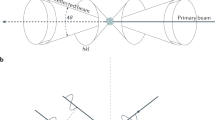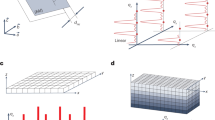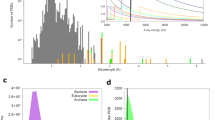Abstract
AN important discrepancy is beginning to make itself felt in X-ray diffraction measurements. At present, lattice spacings of crystals are based on the Siegbahn X-unit1, which is defined as 1/2814.00 of the 200 spacing of rocksalt ; this definition made the X-unit as near as possible to 10-3 A., in the light of the then-known value for Avogadro's number, N0. Such a standard was necessary because relative measurements of wave-lengths could be made much more accurately than absolute ones.
This is a preview of subscription content, access via your institution
Access options
Subscribe to this journal
Receive 51 print issues and online access
$199.00 per year
only $3.90 per issue
Buy this article
- Purchase on Springer Link
- Instant access to full article PDF
Prices may be subject to local taxes which are calculated during checkout
Similar content being viewed by others
References
Siegbahn, M., "The Spectroscopy of X-Rays" (London, 1925).
Birge, R. T., "Reports of Progress in Physics", 8, 118 (1941).
DuMond, J. W. M., and Bollman, V. L., Phys. Rev., 50, 524 (1936); 54, 1005 (1938).
Bearden, J. A., J. App. Phys., 12, 395 (1941).
Warren, B. E., J. App. Phys., 12, 375 (1941).
Author information
Authors and Affiliations
Rights and permissions
About this article
Cite this article
LIPSON, H., RILEY, D. Absolute X-ray Wave-lengths. Nature 151, 250–251 (1943). https://doi.org/10.1038/151250b0
Issue Date:
DOI: https://doi.org/10.1038/151250b0
This article is cited by
-
Lattice Constant of Diamond and the C–C Single Bond
Nature (1944)
-
Absolute X-ray Wave-lengths
Nature (1943)
Comments
By submitting a comment you agree to abide by our Terms and Community Guidelines. If you find something abusive or that does not comply with our terms or guidelines please flag it as inappropriate.



